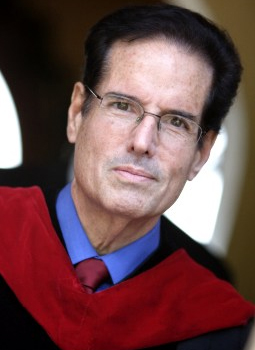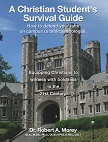Bible Prophecy
By Dr. Robert A. Morey
America has gone prophecy mad. If you read popular magazines like Time or Newsweek or if you read the technical scientific journals of our day, you will find prophetic studies on what the world will be like in the 20th century and beyond. The secularists do not call these projections concerning the future "prophecy" for that word has too much of a religious connotation. Instead of "prophecy" they use the word SCENARIO, which means to outline the coming events. I am sure that you have been required to read much in the area of secular scenarios. Some of you have read 1984, The Biological Time Bomb, or any number of the multitude of books which seek to tell us what the future holds.
The Christian in the 20th century can take advantage of the present popularity of prophetic studies in the secular world by putting forth intelligibly the divine, inspired scenario of coming events. While the world can only guess about the future, the Christian has a sure word of prophecy (11 Pet. 1:19). We know through Scripture the main points of the future. We must, therefore, be prepared to give a logical and reasonable reply to anyone who questions us concerning the prophetic hope within our hearts. This will be in obedience to I Pet. 3:15, 16.
We should be prepared to answer the secular world when it asks us concerning the Christian scenario. How?
1. Make Christ the Lord of our life. Without the new birth, you will not be personally prepared to experience the future.
2. Have a prepared answer: a knowledgeable and intelligent understanding of Biblical prophecy.
3. Manifest a proper attitude toward others
a. meekness: humility
b. fear: respect
4. To maintain a good conscience free of guilt.
I. Principles of Approach
A. In dealing with prophecy, we should begin by stressing the common denominators that are held by all Bible believing Christians instead of stressing the areas of disagreement.
1. Christ is coming back to this earth literally, visibly, and personally.
2. Eventually all the dead bodies of all departed souls will be resurrected.
3. The Christians alive at the Second Coming will be translated without tasting death.
4. All the Non-Christians will stand before Christ on the Day of Judgment.
5. All Christians will one day stand before Christ for Judgment.
6. This present world will be destroyed by fire and a new earth and new heavens will be created.
7. The righteous will go into eternal conscious blessedness and the wicked into eternal conscious torment.
B. The differences of opinion over the minute details of prophecy should never constitute the test of fellowship, friendship, or membership.
C. It is important to study prophetic positions other than your own position, because
1. You may be wrong.
2. You need to understand compassionately the doctrinal views of Christians who disagree with you.
3. Your own position will be stronger if it is tested by being exposed to other positions.
4. Truth is never afraid of light.
II. Diagram #1 A Bird's Eye View of the Historic and Majority View.
A. Historic: Can be traced back through the centuries to the apostolic age.
B. Majority: The vast majority of God's people throughout the centuries and today hold to this view.
III. Main points of diagram #1
A. Christ is sitting on His throne and reigning right now over His kingdom. We don't look forward to the reign of Christ in the future because we are experiencing that reign in the present.
1. Lk. 1:31-33; Acts 2:29-36.
2. Eph. 1:20-22.
3. Rev. 1:5.
B. The present church age is the Kingdom of Christ.
1. Col. 1:13.
2. 1 Cor. 15:23-28.
3. Matt. 13:41.
4. Matt. 24:14; Acts 20:25; 28:23, 31.
C. When Christ returns there will be a general resurrection of all the dead.
1. John 5:25-29.
2. John 11:24.
3. 1 Cor. 15-22.
D. When Christ returns, it means the Day of Judgment and the end of the world.
1. Matt. 24:3.
2. I Cor. 15:23, 24.
3. II Peter. 3:12-14.
4. Matt. 25:31-46.
IV. The First Issue: Is Christ's Return Imminent?
A. The common denominator: No Christian can rightfully set a date for Christ's return for no one knows the exact hour or day of His return. (Matt. 24:36, 42, 44; 25:13).
B. The imminent return theory: According to Dispensationalism, Christ's return is possible this very second. It is always at hand, ready to happen at any moment. There are no signs or prophecies that must precede Christ's coming for the church. It will be an absolute surprise to the Christian for it will come "as a thief in the night." This means Christ's return will be sudden, without warning, a surprise, and a secret. According to this theory, Christ's return was imminent for the apostles for they looked for Christ's return to happen suddenly and without warning. It has always been imminent through the ages.
C. See our article, "Imminent Return of Christ Today" for response of historic Christianity to the Dispensational teaching.
V. Is Christ's Return Post-Tribulational?
The following pages point out the Scriptural evidence which supports the doctrine that Christ will return at the end of the world to gather his people, judge the wicked, and usher in the eternal state.
A. I Cor. 15:51-54 compared with Isaiah 25:6-8
1. In verse 54, Paul says the prophecy of Isaiah 25:8 will be fulfilled at the time of the resurrection and translation of the church. (vs. 51-53).
2. Isaiah 25:8 states the swallowing up of death will take place at the end of the tribulation (Isaiah 24:20-23), in connection with the setting up of the everlasting kingdom (Isaiah. 25:6-9).
3. In I Cor. 15: 51-54, the resurrection and translation of the church will take place at the end of the tribulation in connection with the setting up of the everlasting kingdom.
B. Since the prophecy is post-tribulational, the fulfillment must be post-tribulational. If the church is not resurrected at the end of the tribulation, the prophecy of Isaiah 25:8 was a mistake on the part of Isaiah or I Cor. 15:54 was a mistake by the apostle Paul. Accepting the fact that Isaiah and Paul were inspired of God and rendered infallible in their writing, the church will be resurrected and translated at the end of the tribulation.
1. Romans 8:18-23: All Christians (vs. 18,23) and the entire creation (vs. 19-23) will be set free from the effects of the fall of Adam unto glorious liberty "at the manifestation of the sons of God"(v.19), when the believers receive "the adoption, to wit, the redemption of the body" (v.23). The creation is delivered at the end of the tribulation when the Lord comes. This requires us to place the resurrection of the church at the end of the tribulation. No other time is possible! The coming of Christ means the end of the tribulation, the deliverance of creation, and the setting up of the everlasting kingdom.
2. 1 Corinthians 15:23, 24
a. Paul is discussing the future resurrection of the church (vs. 19-220).
b. He says when Christ resurrects His church, this resurrection:
(1) ends the tribulation.
"Then cometh the end ... when he shall have put down all rule and all authority and power" (v.24).
(2) inaugurates the everlasting kingdom (vs. 25-27).
c. Thus the resurrection of the church takes place at the end of the tribulation in connection with the setting up of the everlasting kingdom.
3. 11 Thessalonians 1:6-10
a. Paul states that unbelievers will be punished and the church will receive her rest from persecution: "When the Lord Jesus shall be revealed from heaven with his mighty angels taking vengeance on them that know not God, and... to be glorified in his saints." (vs. 6.7, 9).
b. The glorious Second Coming of Christ at the end of the tribulation will give rest to the church and judgment for the world. "And to you who are afflicted rest with us, at the revelation of the Lord Jesus from heaven with the angels of his power in flaming fire." (v. 7-A.S.V.).
c. The coming of Christ means rest and resurrection for the church, judgment for unbelievers, the redemption of creation, the end of the tribulation, and the setting up of the everlasting kingdom.
4.11 Thessalonians 2:1-17
a. The phrases "The coming of our Lord Jesus Christ" and "The Day of the Lord" are both equal to the phrase "our gathering together unto him." (vs. 1, 2).
b. The day when the Lord Jesus gathers us unto Himself will be the day He destroys the antichrist and judges the world (v.8). This event happens at the end of the tribulation.
c. Our gathering unto Christ cannot take place until the apostasy and the take-over of the antichrist is established (vs. 3-12).
d. Thus the coming of Christ means the end of the tribulation, the destruction of the antichrist, the judgment of the world, and the gathering of the church.
5. Matthew 24 (Mk. 13 and Lk. 21)
a. In this passage Jesus told His disciples what they should expect during this age of tribulation. He told them to expect persecution (vs. 9, 10), apostasy and false prophets (vs.4-5, 11-13, 23-26), international wars (vs.6, 7), the abomination of desolation committed by the antichrist (v.15), a hasty flight to safety (vs.6-20) and at the end of the age, the coming of Christ, and the gathering of the church (vs. 29-31).
b. The proof that Jesus was addressing His church through the apostles is found in:
1) The Lord's supper was instituted two nights later. The church recognizes that Jesus was speaking to the church through the apostles.
2) The great commission and all the great discourses of Christ are applied to the church through the apostles.
3) If you reject Matthew 24, as not applying to the church, you must reject the Lord's Supper, the great commission, and all material found in the gospels.
4) "The elect" refers to the church throughout the New Testament (Matthew 24:31; Rom. 8:33, Col. 3:12, 11 Tim.2:10).
5) The church historically has always applied Matthew 24 to itself.
c. The only coming of Christ taught by Christ Himself is the post-tribulational coming. To ignore the words of Jesus on the subject of any doctrine is to come under the condemnation of the Apostle Paul. (I Tim. 6:3-5).
6. Matthew 24: 30, 31;Thess. 4:16, 17; 11 Thess. 2:1
a. In I Thess. 4, Paul describes the rapture of the church in the following terms:
1) The descent of the Lord
2) A Trumpet
3) A great voice of the archangel
4) The resurrection and translation of all who are in Christ-this event is called "our gathering together unto Him" in 11 Thess. 2:1.
b. Matthew 24: 30, 31, gives us all the ingredients of the rapture as described in I Thess. 4:16, 17.
c. The rapture of Matthew 24 is the same rapture of I Thess. 4. The proof for this is:
1) Matthew 24 is the only passage that fits the description of the rapture of I Thess. 4.
7. The churches resurrection contains the "last trumpet" (I Cor. 15:52). The last
trumpet is blown at the end of the tribulation as described in Mt. 24:29, 31.
8. The same Greek word for "gather" is used in Mt.24-31 and 11 Thess. 2:1.
9. Daniel 12:2, 3: Lk.21:28; Rev. 11:18
All these passages place the resurrection of believers at the end of the tribulation in connection with the setting up of the everlasting kingdom.
10. Luke 17:28-36 (Matt. 24:40, 41)
a. The rapture is described in these passages.
b. As Lot was taken out of Sodom by angels just prior to the final outpouring of God's wrath, so at the end of the tribulation just before God's final wrath is outpoured, the elect shall be gathered by the angels (Mt. 24:31).
c. The rapture is at the end of the tribulation. It is pre-wrath but post-tribulational (Matt. 24:29-31).
11. I Thessalonians 5:1-6
a. The Day of the Lord will overtake unbelievers "as a thief in the night", vs. 2, 3.
b. But this day shall not overtake Christians "as a thief in the night" vs. 4.
c. The day of the Lord will overtake both Christian and non-Christian. To the
Christian it means joy and to the non-Christian it means judgment.
d. The "day of the Lord" does not refer to the tribulation but rather to the post-tribulational return of Christ (II Thess. 2:1-17). Thus the coming of Christ for His church as outlined by Paul in I Thess. 5:1-6, is at the end of the tribulation in connection with the judgment of the wicked.
12. Psalm 110:1, Acts 2:35; Hebrews 1: 3, 13, 10:12, 13
a. Jesus is now sitting at the right hand of the Father in Heaven.
b. He is to remain there until God has brought the earth into submission. This Happens at the end of the tribulation.
c. Thus Jesus is not to leave this thronein heaven until the end of the tribulation. The only coming of Christ possible is the glorious return of Christ at the end of the tribulation.
13. Acts 3:21
Christ will stay in heaven until "the time of the restoration of all things." This refers to the judgment of the world. He will not return until He comes to restore all things under His authority. This can only mean He cannot return until the tribulation is over.
14. All the Greek terms employed in the New Testament to describe the coming of Christ refer to a visible glorious coming. These various terms are used interchangeably. The only coming of Christ found in the Greek New Testament is the glorious post-tribulational return of Christ.
The coming of Christ means rest, resurrection and rapture for the church, the destruction of the Antichrist, the judgment of unbelievers, the deliverance of creation from the curse of Adam's fall, the restoration of all things, the end of the tribulation, and the setting up of the everlasting kingdom.
VI. The Amillennial Position
1. The simplest and least complicated of all positions.
2. It is not liberalism but is as orthodox as the historic creeds of the church (Apostle's, W.C.F., Formula of Concord).
3. It has been held by great Christians throughout the ages. (Augustine, Calvin, Vos).
4. Main points in Diagram #1
a. Satan is bound so that he cannot at this time deceive all the nations again. The Gospel can freely penetrate all nations. (Matt. 12:22-29; John 12:31-33; 16:7-11; Col. 2:14, 15; Heb. 2:14, 15; Rev. 1:18; 1 John 3:8; Eph. 1:20-22; Rev. 20:1-3).
b. Christ's kingdom is the church.
c. He sits in David's throne now.
d. Satan will be let loose at the end of the age and will deceive the nations once again and will seek to destroy the church. (11 Thess. 2:1-12; Rev. 6:9-11; 13:1-10; 20:3, 7-9).
e. When Christ returns, this means the end of history and the beginning of the eternal state. (Matt. 13:24-, 25; 1 Cor. 15:5, II Tim. 4:1; Rev. 20:10-15; 21; 22).
Conclusion
No one should be dogmatic on such issues as Bible prophecy. Good and godly men have disagreed down through the centuries. The views above are not final but as our own feeble attempt to think through the issues and passages that apply to this doctrine.






































